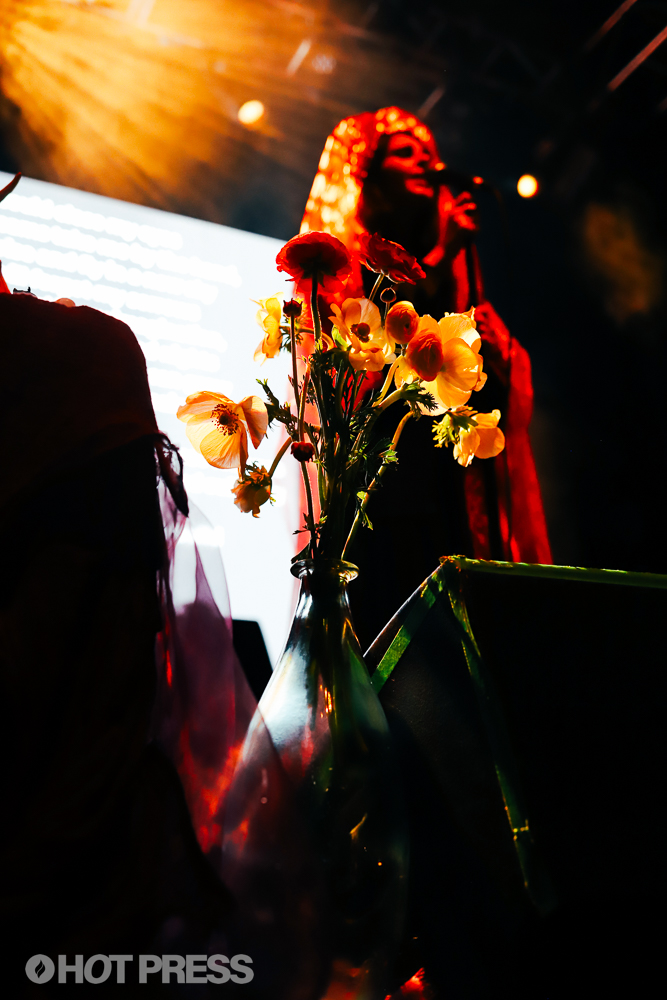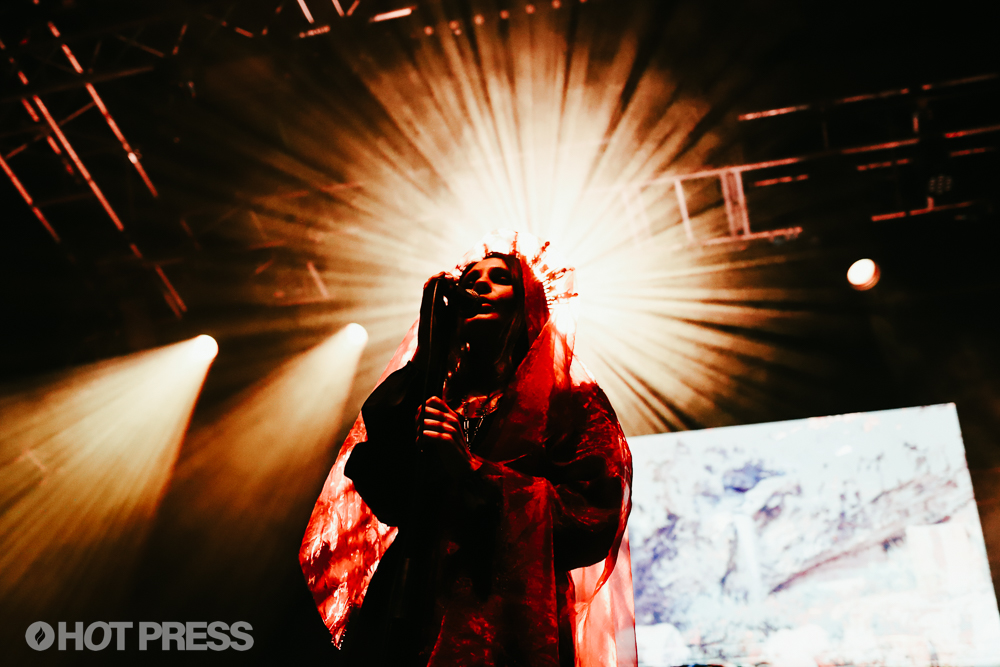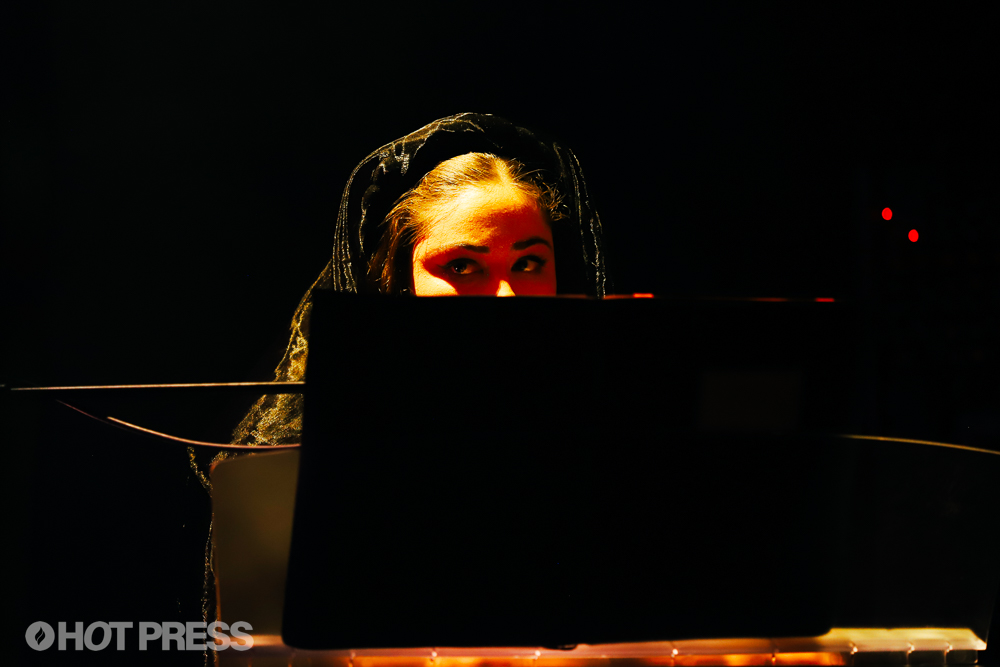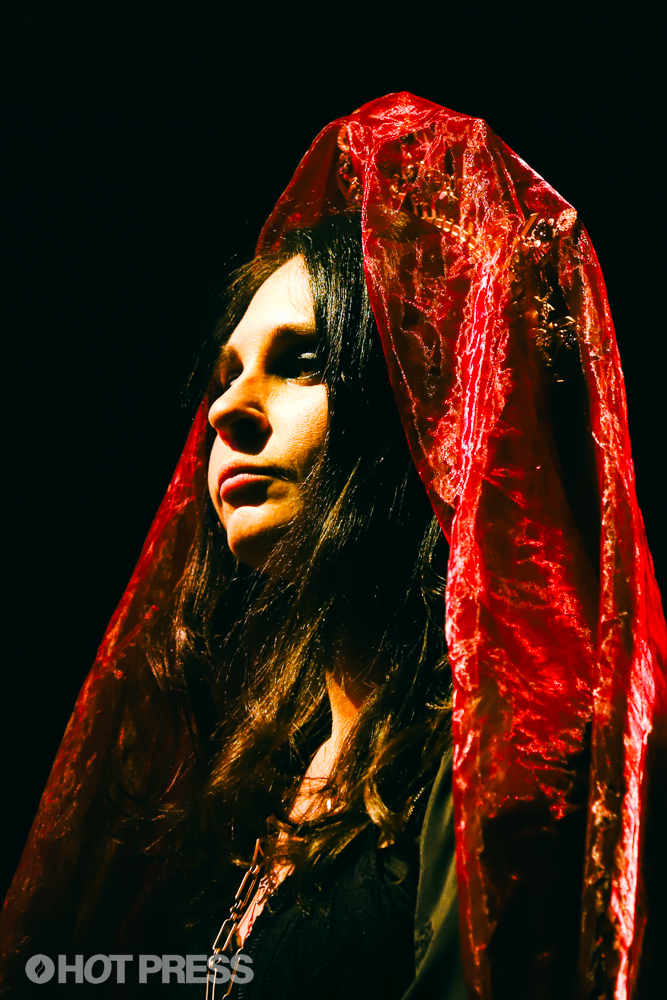- Music
- 01 May 25
Live Report: Róisín El Cherif honours her roots with glistening multi-disciplinary performance

Irish-Palestinian singer-songwriter Róisín El Cherif took over The Button Factory yesterday for an emotional and reflective set, blending music, cinema and visual arts.
Tonight, the stage of The Button Factory is covered in flowers and deer skulls, filling up the space between four chairs and a lone microphone in the centre. In the backdrop, before Róisín El Cherif enters, plays an extract from Leila And The Wolves, Heiny Srour’s drama-documentary from the ‘80s, offering a woman’s perspective of the Middle East, Lebanon and Palestine.
As the film fades away, El Cherif walks into the room, the weight of her presence amplified by the empty stage, before launching into an a capella performance in Arabic, her voice powerful enough to carry through the venue. As she walks back out, an extract from the Mohammed Bakri documentary Jenin, Jenin, takes her place. In it, a young girl is seen speaking about her life in the Jenin refugee camp — about the horrors of war, the destruction and her own sense of belonging. A quiet theme which runs throughout the entirety of the show, unspoken and yet infinitely heavy.
 Roisin El Cherif at The Button Factory on April 30th, 2025. Copyright Abigail Ring/ hotpress.com
Roisin El Cherif at The Button Factory on April 30th, 2025. Copyright Abigail Ring/ hotpress.comWhen El Cherif steps back in, she is accompanied by her band, all draped in delicate black veils, and murmuring incantations, ominously repeated by the crowd. “All that is raveled will be unraveled,” she says, before smiling into her mic: “In the name of the mother, the daughter, and the holy fucking ghost,” she continues, “put your hands together for Róisín El Cherif!”
Accompanied by the soft strings of a harp, a fiddle, a cello and a piano, the singer-songwriter jumps into the incredibly moving ‘حلم’, or ‘Hulm’ which translates to “Dream.” All throughout, El Cherif’s buttery-smooth vocals effortlessly carry the emotional intensity demanded by the occasion, grief and hope almost palpable in the way her voice cracks and picks back up again, like an unstoppable force.
 Roisin El Cherif at The Button Factory on April 30th, 2025. Copyright Abigail Ring/ hotpress.com
Roisin El Cherif at The Button Factory on April 30th, 2025. Copyright Abigail Ring/ hotpress.comWhile the musician alternates between Arabic folk songs and English-language tunes (such as her 2016 debut single ‘Kerosene’), footage of Palestinian landscape is projected in the background, El Cherif and her band standing proud and tall, their thinly-draped silhouettes ominous against the white light.
When speaking about her show to Hot Press, the musician had explained that she planned to go “in full banshee mode, bringing in the magic element of the cailleach and Irish folklore and mythology.” If the singer has said she finds comfort in honouring her double heritage this way, the blend of cultures also adds a new layer of mysticism and historical weight to this homage to Palestine and its people.
 Roisin El Cherif at The Button Factory on April 30th, 2025. Copyright Abigail Ring/ hotpress.com
Roisin El Cherif at The Button Factory on April 30th, 2025. Copyright Abigail Ring/ hotpress.comAfter an hour spent alternating between music, films and theatrical banter, El Cherif announces her last song of the evening, “a little witchy anthem,” she jokes, “titled ‘Running Up That Hill’”. If Kate Bush is a famously difficult artist to cover, El Cherif manages to interpret the track with disconcerting ease, adding a new gently moving layer to its melody while never losing its powerful spirit of the track.
In a stirringly poignant encore, El Cherif closes the evening with an interpretation of her song ‘Siúl a Rúin’, a traditional Irish ballad sung in Irish, English and Arabic – the perfect representation of what the show is all about: finding a sense of belonging within the horrors.
 Roisin El Cherif at The Button Factory on April 30th, 2025. Copyright Abigail Ring/ hotpress.com
Roisin El Cherif at The Button Factory on April 30th, 2025. Copyright Abigail Ring/ hotpress.comIn an incredibly ambitious performance, sitting at the crossroad of two different cultures and artistic disciplines, El Cherif and her band explore the horrifying grief that have been attached to Palestine for the past two years – attempt to make sense of it and honour it, without falling into easy clichés, and instead offering something raw, gripping, and yet unwaveringly hopeful.
RELATED

- Music
- 28 Jan 26
Goat announce Button Factory show

- Music
- 17 Dec 25
Death in Vegas add second Button Factory gig
RELATED

- Pics & Vids
- 17 Nov 25
RÓIS at the Button Factory (Photos)

- Music
- 16 Oct 25
Live Report: Nova Twins storm the Button Factory stage

- Music
- 25 Sep 25




